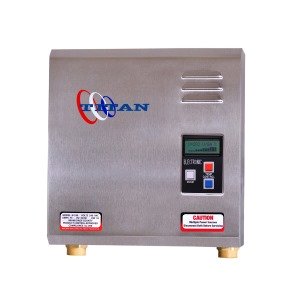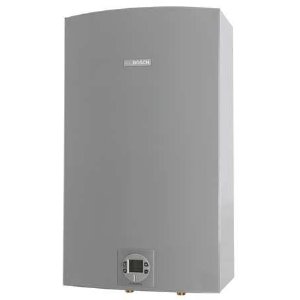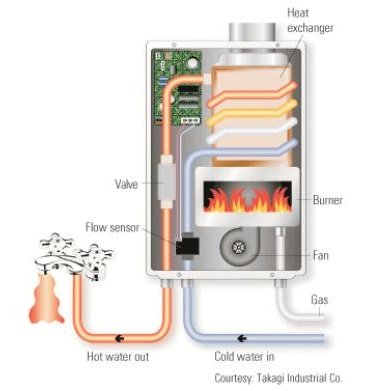- Review
- Best
- Tank-type
- Heat Pumps (Hybrids)
- RV Water Heaters
- Gas
- Electric
- Pool Heaters
- Solar
- Bosch
- Navien
- Noritz
- Paloma
- Rinnai
- Takagi
- American
- AO Smith
- Bradford White
- GE
- John Wood
- Reliance
- Rheem
- Richmond
- Ruud
- State
- US Craftmaster
- Hydronic Heating
- Troubleshooting
- Maintenance
- Parts
- Buy on amazon
- Sitemap
- What's New
- Privacy
- Disclaimer
- Contact
Tankless Water Heaters
Review and Buying Guide
Tankless water heaters review and buying guide - pros and cons, benefits, top features, best brands, and models. What to look for and expect to avoid potential problems and expensive troubleshooting.
When searching for residential tankless water heaters, also called on-demand and instant hot water heaters, it is important to know that the tankless system and heating process are different from the tank-type systems. Use this article to explore how these high efficient and condensing products can benefit you, reduce energy consumption and pollution, and save you money.
Need professional help with your water heater?
Get free quotes today!
There is a lot to read about tankless... so if you would like to know about the best models and check the reviews - read this article. If you would like to buy Rinnai, Noritz, Rheem, Navien, Stiebel Eltron, Eemax, Rheem, or any other top models, check out amazon.com.
Highlights
- Top reasons to buy tankless
- Types
- How tankless works
- Video: Tankless basics
- Manufacturers
- Advantages and disadvantages
Top reasons to buy tankless
The main advantages of the best tankless water heaters are the tankless design that provides on-demand, continuous flow, and an endless supply of hot water.
Tankless is known for its low energy consumption (up to 50% reduction when comparing it to tank-type heaters), small and compact design, replaceable parts, and condensing technology.
This Rinnai model is a great example - it offers quality elements resulting in superior efficiency, high performance, energy and emission reduction, and, most important - savings.
When comparing tankless technology with storage tanks, you will see that the conventional type is heating water even if there is no demand, while the tankless appliances work only when the hot water tap is open or on-demand.
Tankless water heaters can use gas or electricity. The favorite type of homeowners is the gas-powered with the electronic ignition, but you can also find models with the continuously burning pilot light, both types having pros and cons.
The size of the unit you need depends on demand, house, and family size, so check out the sizing guide. Some manufacturers offer a multi-system setup that can link several units into one system to satisfy the high demand of large homes.
The majority of these tankless hot water heaters are the whole-house type, as they have a higher GPM flow rate for high hot water demand and more than one application at a time.
Some manufacturers offer models for combined water and space heating, allowing even more options and savings for homeowners. These are known as combi boilers, such as this Navien.
Buy the Best of Rinnai
Type review
Electric-powered
 Titan electric
Titan electricElectric tankless hot water heaters have a compact and small design, allowing the wall mount and under the sink installation, saving you lots of space. They have a long service life as they are less prone to hard water and sediment deposits. There are two types to buy; point-of-use and whole-house.
Compared to the gas type, electric tankless water heaters do not require venting and do not produce greenhouse gases.
Top 3 selling brands on Amazon.com are:
Gas-powered
 Bosch gas
Bosch gasGas tankless hot water heaters are environmentally friendly appliances also. Many of them utilize advanced technology for energy efficiency and meet strict emission standards. They can use natural gas or propane - LP. Gas tankless water heaters produce higher flow rates than electric ones.
Tankless hot water heaters can be further divided into two categories; one that can only work as on/off (older models) and the other with the modulation (utilizing the modulating gas valve).
Hot water heaters with modulation have the heat output depending on the water flow. For example, if the demand for hot water is higher, the modulating gas valve provides more gas, resulting in more power.
The best of gas tankless models are those that utilize the condensing technology - where the "hidden" gas flue energy is used for preheating and superior efficiency - Rinnai RUC98 is a great example - energy factor is ultra-high, 0.96 and due to its ultra-low NOx emission is great on the environment.
Top 3 selling brands on Amazon.com are:
How tankless works
 How tankless works
(photo by Takagi)
How tankless works
(photo by Takagi)After checking how tankless water heaters work, you will see that these models are more complex than standard cylinder types, so more knowledge and skills are required before installing or servicing them. This is especially true when dealing with gas-powered units.
How electric tankless type works
Electric tankless heaters utilize the heating element controlled by the flow-sensing device that operates with constant heat input and maximum flow rate. The flow rate depends on the pressure, which can be adjusted on the knob.
If there is a request for the maximum flow, the outgoing water toward the hot water tap will be cooler since it spends less time passing through the heat exchanger.
How gas type works
Modern gas-powered tankless models use the latest technology where the output temperature, flow, safety, and other parameters are controlled and regulated by the electronic circuit board or a small computer. Good examples are Rinnai, Noritz, Takagi, or Paloma.
When you open the hot water tap, a flow sensor in the tankless hot water heater sends the signal to the electronic module. From there, the signal goes to the gas valve to open the gas flow.
If all the requirements are met, natural gas or propane flows into the burner located inside the combustion chamber. The gas is ignited either by the pilot flame (older models) or spark from the electrode.
Burning gas heats the heat exchanger, where the incoming cold water gets quickly heated to the pre-set and desired temperature. The heat exchanger transfers the heat from the burner to the water heating instantaneously. A vent pipe vents products of combustion out using the direct vent or powered vent system.
Once the faucet is turned off, the flow stops, and the flame goes out. As can be seen from the above explanation, tankless water heaters heat the water on demand while providing you with an endless supply of hot water. These models are mainly installed on the wall, saving the floor space for other use.
Video: Tankless basics
Manufacturers
Here is the list of the popular residential tankless hot water heaters in the US and Canada, where many gas-type units are Energy Star qualified; some brands are cheap while others, more advanced, are expensive.
Gas-type
Electric-type
Advantages and benefits
- Endless hot water supply. Run out of water? Never.
- Durable, lifespan is 20 years or more (for some).
- You can save up to 50% of energy and heating costs.
- High-efficiency heaters available, marked as Energy star.
- Flexible installation options can be installed anywhere, inside or outside the house.
- Lower greenhouse gas emissions.
- The reliability rating is 99%.
- Safety - no scalding injuries.
- Provides you with clean and fresh hot water.
- No tank - no leaking problems.
- Some models use smart technology with the self-diagnostic program (great for troubleshooting and repairs) and precise temperature control for enhanced safety and comfort.
- The government tax credit, rebate, and other incentives available to homeowners with advanced and high efficient models.
- Powered by natural gas or propane (LP).
- All the parts are replaceable.
Disadvantages
- With the high up-front costs, tankless systems can cost up to three times as much as tank-type heaters.
- Required upgrades like venting system or gas line are costly.
- The hot water output is split among all the household fixtures, resulting in inconsistent water temperature, temperature fluctuation, or "cold-water sandwich." This applies to economy-type units.
- Venting gas and propane units require expensive stainless steel tubing; for some brands, other materials are used.
- Electric instant water heaters may require an additional circuit and lots of energy.
- Gas water heaters require additional expenses of an annual servicing.
- Instant water heaters need a minimum flow rate to activate the heat exchanger.
- Tankless water heaters rely on the pressure that is delivered to your home - the reason why you need a good plumbing system.
Summary
As can be seen, there are many reasons why buying a tankless water heater is a good idea and a long-term investment.
To summarize; with the tankless, you can forget about running out of hot water, sediment build-up, bacteria build-up and rotten egg odor, discolored water, long recoveries, space issues for installation, energy waste, unnecessary energy use when hot water is not used, short life, etc.
Related articles
- Get Help for your tankless water heaters, from local PROs!
- Troubleshooting tankless water heaters
- Comparing tankless models
- How to winterize tankless
- Installing tankless
- Benefits
- Tankless maintenance
- Tankless vs. tank-type
Leave a Comment!
What Other Visitors Have Said
Eemax Electric Water Heaters Piece of Junk 




In 2008 when remodeling our home we chose a Eemax Tankless Electric Water Heater and had it professionally installed. It failed during the warranty period …
Buying tankless water heater... 




OK. I have few questions about using tankless water heaters in home. I like the idea to heat water on demand and their small size.
But, are the tankless …
Shower water temperature fluctuation to extreme 




We recently installed a tankless electric water heater in our ranch home and are really dissatisfied. The shower water, which is close to the heater is …
Noritz vs. Rinnai 



Noritz vs. Rinnai... which tankless water heater is better?
As there are many inquires online about comparing Rinnai and Noritz water heaters, I will …
Bosch 250SX NG water heater is a piece of Junk Not rated yet
My wife and I had chosen Bosch 250 SX tankless water 5 years ago. We had it installed by a professional service. Man, was that mistake as soon as the warranty …
Gas tankless won't supply hot water to washer Not rated yet
My gas tankless water heater does not work properly with the high efficiency, energy saving washers because of the way they mix the water while filling. …
Tankless water heater problem Not rated yet
I had one of the tankless water heaters installed by a plumbing company on May 20, 2010, and it has been a constant ongoing source of problems since it …
- Home
- Tankless water heaters



